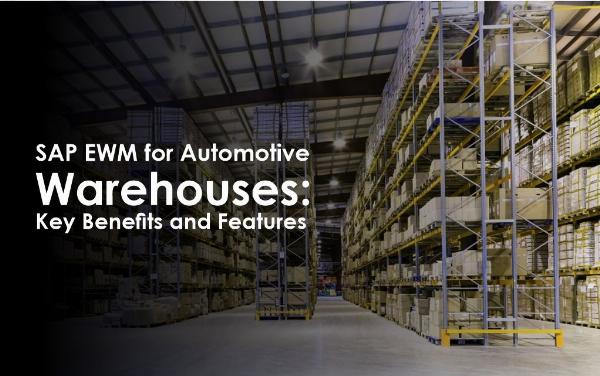SAP EWM for Automotive Warehouses: Key Benefits and Features

Strong 8k brings an ultra-HD IPTV experience to your living room and your pocket.
In the automotive industry, managing a warehouse efficiently is crucial to ensuring that the right parts are available at the right time, minimizing production delays and maintaining a smooth supply chain. Automotive warehouses face unique challenges due to the variety of components, high turnover rates, and the need for precise inventory management. SAP Extended Warehouse Management (EWM) is a powerful tool designed to address these challenges. It offers a comprehensive set of features tailored specifically for automotive warehouses.
In this blog, we will explore the key benefits and features of SAP EWM for automotive warehouses.
1. Enhanced Inventory Management and Accuracy
One of the primary benefits of SAP EWM for automotive warehouses is its ability to enhance inventory management. The automotive industry relies heavily on just-in-time (JIT) and just-in-sequence (JIS) manufacturing, making accurate inventory management vital. SAP EWM provides:
- Real-Time Inventory Tracking:Using advanced tracking technologies such as RFID and barcode scanning, SAP EWM ensures that every item is accounted for in real-time. This reduces the risk of stockouts or overstocking, which can disrupt production lines.
- Automated Replenishment: The system supports automated replenishment processes, ensuring that inventory levels are maintained at optimal levels without manual intervention. This is particularly beneficial for high-turnover automotive components.
2. Optimized Storage and Space Utilization
Automotive warehouses often store a wide range of items, from small components to large parts. Efficient storage is essential to maximize space and improve accessibility. SAP EWM offers features that help optimize warehouse storage:
- Slotting and Rearrangement: SAP EWM includes slotting and rearrangement functionalities that optimize storage locations based on product characteristics, demand frequency, and warehouse layout. This ensures that frequently used items are easily accessible, reducing picking times.
- Dynamic Storage Allocation: The system allows for dynamic allocation of storage space, adjusting to changing inventory levels and product sizes, thereby maximizing the use of available space.
3. Streamlined Inbound and Outbound Processes
Automotive warehouses handle a high volume of inbound and outbound shipments, requiring efficient processes to avoid delays. SAP EWM streamlines these processes through:
- Advanced Putaway and Picking Strategies: The system supports multiple putaway and picking strategies, such as FIFO (First-In-First-Out), LIFO (Last-In-First-Out), and cross-docking, which are critical for managing a diverse inventory effectively.
- Efficient Goods Receipt and Issue Processes: SAP EWM automates goods receipt and issue processes, reducing the time and labor required to process inbound and outbound shipments, thereby enhancing overall operational efficiency.
4. Improved Labor Management and Productivity
Labor costs are a significant part of warehouse operational expenses. SAP EWM offers advanced labor management tools to optimize workforce utilization:
- Task Interleaving: SAP EWM enables task interleaving, allowing workers to perform multiple tasks in a single trip, such as combining picking and putaway tasks. This reduces empty travel time and increases overall productivity.
- Real-Time Task Assignment and Monitoring: The system provides real-time visibility into labor activities, enabling managers to assign tasks dynamically based on worker availability and skill, ensuring efficient use of resources.
5. Seamless Integration with Manufacturing and Supply Chain Processes
For automotive warehouses, seamless integration with manufacturing and supply chain processes is critical to ensure smooth operations. SAP EWM offers robust integration capabilities:
- Integration with SAP ERP and S/4HANA: SAP EWM integrates seamlessly with SAP ERP and SAP S/4HANA, allowing for real-time data exchange between the warehouse and production facilities. This ensures that manufacturing lines receive the necessary components on time, reducing downtime and increasing efficiency.
- Support for Just-In-Time (JIT) and Just-In-Sequence (JIS) Processes: SAP EWM supports JIT and JIS processes, which are essential for automotive manufacturers that rely on precise timing and sequencing of parts for production.
6. Advanced Yard Management for Automotive Needs
Automotive warehouses often have complex yard operations, with multiple docks and frequent trailer movements. SAP EWM provides advanced yard management features to manage these complexities:
- Yard Task Management: The system facilitates efficient management of yard tasks, such as trailer movements, loading, and unloading, ensuring optimal utilization of yard space and resources.
- Dock Appointment Scheduling: SAP EWM allows for dock appointment scheduling, reducing waiting times and improving overall yard throughput.
7. Enhanced Compliance and Quality Control
Maintaining quality standards and compliance with regulatory requirements is critical in the automotive industry. SAP EWM helps ensure compliance and quality control through:
- Quality Management Integration: SAP EWM integrates with quality management systems to facilitate quality inspections at various stages, ensuring that only compliant and high-quality components move forward in the supply chain.
- Batch and Serial Number Management: The system supports batch and serial number tracking, which is essential for traceability and compliance with automotive industry standards.
8. Scalability and Flexibility for Future Growth
The automotive industry is constantly evolving, and warehouses need to adapt to changing demands. SAP EWM provides a scalable and flexible solution:
- Modular Architecture: SAP EWM’s modular architecture allows businesses to scale their warehouse management system according to their needs, adding new functionalities as required without disrupting existing operations.
- Customizable Features: The system offers a high degree of customization, allowing automotive warehouses to tailor processes and workflows to their specific operational requirements.
Conclusion
SAP EWM offers a robust solution for automotive warehouses, providing advanced features and capabilities that address the unique challenges of the automotive industry. From enhancing inventory management and optimizing storage to improving labor productivity and ensuring compliance, SAP EWM empowers automotive warehouses to operate more efficiently and effectively. By leveraging the full potential of SAP EWM, automotive companies can enhance their supply chain operations, reduce costs, and improve overall service levels, positioning themselves for success in a highly competitive market.
For automotive warehouses looking to stay ahead, implementing SAP EWM is a strategic move towards achieving operational excellence and maintaining a competitive edge in the industry.
Note: IndiBlogHub features both user-submitted and editorial content. We do not verify third-party contributions. Read our Disclaimer and Privacy Policyfor details.


